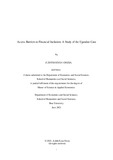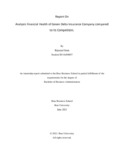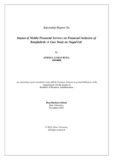Access barriers to financial inclusion: a study of the Ugandan case

View/
Date
2021-06Publisher
Brac UniversityAuthor
Onzia, Judith EyoaMetadata
Show full item recordAbstract
Financial inclusion is a policy concern around the world. Uganda’s financial sector comprises formal, semi-formal and informal institutions that offer services such as banking services including opening bank accounts, savings deposits, and access to credit, bill payments, mobile money, and insurance. Financial institutions have routinely excluded many citizens. Since poor and low-income people do not have much cash, non-access to credit has limited their participation in the market. This study on the financially excluded population has explored barriers to access financial services. To identify these barriers, the study is based on experience, on reports from the financial institutions of Uganda, and on the relevant literature. To assess these obstacles, the Delphi method was adopted, i.e., selection of experts in the area of financial inclusion and obtaining their feedback on the identified hypothesized access barriers to the financial services in Uganda. The study has given particular attention to the causes of barriers to financial services, and suggested measures that may improve inclusion in Uganda. The methodology has included designing a survey instrument, which was sent to 22 experts through email, facebook and whatsapp. These experts were Uganda citizens, both female and male, in the financial sector, NGOs, government officials and institutions, academicians, and researchers. The survey has obtained data on the access barriers to financial inclusion. The hypothesized access barriers have been, on the demand side, have been low income, illiteracy, and limited awareness of financial services, and on the supply side, access barriers included security risks, high transaction costs, poor network infrastructure, ICT and limited access channels. Feedback analysis has revealed that young, poor, and rural individuals are mostly excluded. Financial services are indeed not accessible to rural communities who are largely served by the informal village savings groups, loan associations, and unregistered Savings and Credit Cooperatives Associations (SACCOs). Conversely, formal financial services are available and used widely in urban areas. Public policy may change this situation by disseminating information on available services and by customizing such information to better serve potential rural users.
Keywords
Financial exclusion/inclusion; Financial sector; Financial institutions; Financial services; Access barrier; UgandaDescription
This thesis is submitted in partial fulfillment of the requirements for the degree of Master of Science in Applied Economics, 2021.Department
Department of Economics and Social Sciences, Brac UniversityType
ThesisCollections
Related items
Showing items related by title, author, creator and subject.
-
Analysis financial health of Green Delta Insurance Company compared to its competitors.
Islam, Rejoanul (Brac University, 2021-06)The study has been accomplished by focusing on the title “Analysis Financial Health of Green Delta Insurance Company compared to its competitors”. This report includes an overview of the company, background information, ... -
The rise of young investors: exploring students’ interest in the stock market
Morshed, Abu Saleh Muhammad Sarwar (Brac University, 2023-08)This paper examines the rising stock market participation of young investors, which is being fueled by technology, easy information access, social media influence, and focused educational initiatives. According to the ... -
Impact of mobile financial services on financial inclusion of Bangladesh: A case study on Nagad Ltd.
Roza, Afroza Zaman (Brac University, 2022-11)As a requirement for the completion of the Bachelor of Business Administration (BBA) program, this report is prepared after a 3 months internship at Nagad Ltd. on “Impact of Mobile Financial Services on Financial ...



